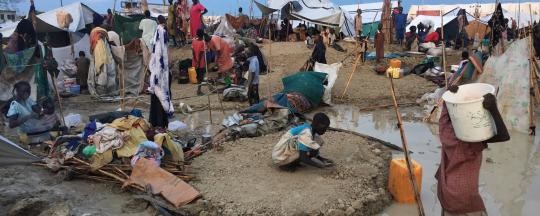48,000 civilians sheltering in the United Nations base in Malakal, South Sudan face deplorable conditions because the UN has only provided half a square kilometer of space for them to live in, MSF said.
The international medical charity which operates a hospital in the Malakal base, demanded the UN immediately provide more space for the civilians inside amid a sharp rise in disease coinciding with an influx of tens of thousands of war weary people into the camp since June.
“The sickness of our patients is directly related to the overcrowded and deplorable conditions in which they are living,” said Monica Camacho, MSF program manager for South Sudan. “More space must be immediately allocated for the population seeking shelter and humanitarian actors must urgently improve the provision of basic services and necessities.”
MSF said the number of consultations provided for children under five years old, who are the most vulnerable in these conditions, has increased five-fold since June, while severe respiratory tract infections have tripled only since September. The group said its hospital has been filled beyond capacity with people facing life-threatening illness.
“Living conditions and sanitation are inadequate throughout the entire camp,” MSF said. “Only about half a square kilometer has been designated by the United Nations for displaced people to live in, comprising a population the size of a small city.”
The group said each person has only 10 square meters per person, including areas used for pathways and latrines which are uninhabitable. In one area, fifty people share a single tent, with just 4.5 square meters of living space per person. International humanitarian standards require 30 square kilomters per person.
“Thousands of new arrivals are suffering in the worst living conditions, sheltering in makeshift shelters in swamped areas of the camp not designated for habitation and which lack adequate access to water and sanitation,” MSF Said. “Children play in filthy mud surrounded by barbed wire and trash.”
Aid groups have previously warned of the dangers of the overcrowding in the Malakal base, including in August this year when there were 46,000 displaced people living there.
The UN recently said it is looking into ways to convince displaced people to leave its bases because it says the displaced present a threat to UN staff in South Sudan. There are about 180,000 people living in a handful of UN bases in South Sudan.
Photo: IDPs at the UN protection of civilians (PoC) site in Malakal, Upper Nile state, South Sudan, copyright IOM 2015.




